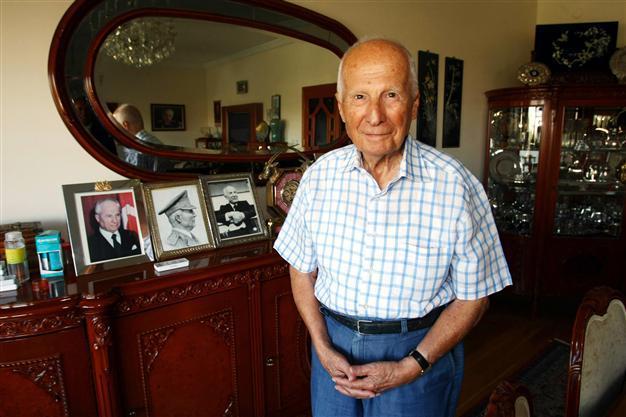1980 military coup leaders sentenced to life in prison
ANKARA

In this photo from 2010, Turkey's former Chief of Staff and President Kenan Evren poses for a photograph at his home in Ankara. Evren, 96, has been sentenced to life imprisonment alongside former Air Force Commander Tahsin Şahinkaya for leading the 1980 coup d'état.
An Ankara court June 18 sentenced the two key defendants in the case of the Sept. 12, 1980 military coup d’état, which deeply affected Turkey’s political and social life, to life in jail.
The court initially sentenced the two surviving members of the junta, coup leader Kenan Evren and then-commander of the Air Force, Tahsin Şahinkaya, to aggravated life sentences on coup charges, before reducing the sentences to life in prison due to attenuating circumstances.
Prosecutor Erdinç Hakan Özdabakoğlu introduced his final opinion in the case ahead of the decision, demanding that Evren and Şahinkaya be sentenced to aggravated life imprisonment on charges related to Article 146 of the Turkish Penal Code (TCK), which covers criminal attempts to change all or part of the Constitution. After the verdict was announced, ruling Justice and Development Party (AKP) spokesperson Hüseyin Çelik stated on his Twitter account that “justice came to life.”
Çelik also said the main opposition Republican People’s Party (CHP) and the Nationalist Movement Party (MHP), which both campaigned to vote “no” to the constitutional changes in the Sept 12, 2010 referendum, paving the way for the coup leaders to be tried, owed the public an apology.
Oktay Vural, the head of the MHP’s parliamentary group, said at a press meeting on June 18 that Sept. 12 “was a coup that was not legitimate in the eyes of the public, and it was already convicted by them.”
CHP lawmaker Ali Rıza Öztürk also said the sentencing the two generals did not amount to a settling of accounts with the coup. “This verdict is about two people whose era is already over,” Öztürk said, also calling for the trial of “those who were behind the coup.”
“The country is today being ruled by the same fascistic understanding of the coup,” he added.
Fifty people were executed, an estimated half a million arrested, hundreds died in prison and many more disappeared during the three years of military rule following the Sept. 12, 1980 coup, Turkey’s third in 20 years.
The 1980 coup leaders argued they were forced to intervene to restore order after years of chaos, in which an estimated 5,000 people died in factional violence between leftist and rightist groups.
Nurettin Ersin, Nejat Tümer and Sedat Celasun, the remaining three members of then-National Security Council, which led the junta, have already died.
Evren, 96, and Şahinkaya, 89, have filed individual appeals to the Constitutional Court, arguing that their rights were violated due to the trial. The court also ruled that the coup leaders should be stripped of their military ranks, which according to lawyer Ömer Kavili makes both ex-generals private soldiers. Both are still being treated at the military’s GATA hospital in Ankara, though Kavili said the hospital had issued a report stating that Şahinkaya was not an in-patient.
Evren and Şahinkaya delivered their final words at the hearing via a video conference. Evren’s display was covered during the prosecutor’s final opinion submission, as his lawyer Sezin Duygu Tuncer said he had to receive a medical dressing.
Mehmet Horuş, a joint attorney in the case, said Evren had also lost the rights that derived from his time as president between 1982 and 1989.
Evren had previously said he would never testify and claimed that he would commit suicide before he could be tried. “I promise in front of my nation that I will not let this matter be dealt with in the courts. I will commit suicide,” he said when the idea of a coup trial was discussed in 2009.
